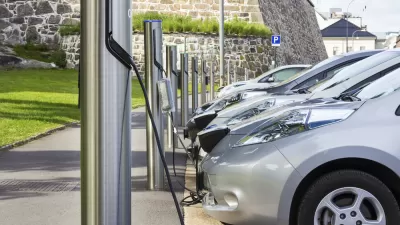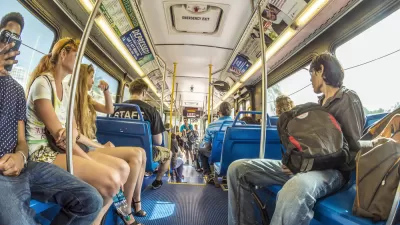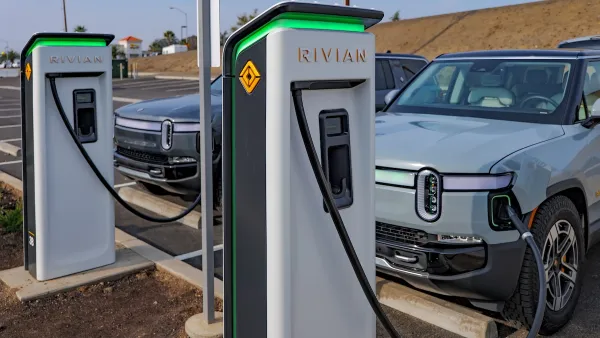The federal government can encourage public transit use and electrification through reforms in transportation systems and land use policies.

As climate change intensifies, writes Kevin DeGood, "[t]he United States must adopt policies and make investments to achieve net-zero GHG emissions by midcentury." Two important steps: "electrifying vehicles and reducing the automobile dependence of communities," which includes "[r]apid electrification of transportation powered by renewable energy."
"In addition to electrification, the federal government needs to substantially reform its transportation policies to reduce auto dependence by directing funds to projects that expand transportation choice—including transit, biking, and walking—and encourage infill development," says DeGood. "Climate change cannot be addressed without reforming land use, and land use cannot be changed without reforming transportation."
The design of transportation systems "has important implications for not only driving and mobile emissions but also the economic productivity of those facilities and the long-term cost burden associated with maintenance." DeGood compares Ohio and Washington, D.C.'s systems: "every lane mile of roadway in Washington, D.C., supports, on average, 4 1/2 times as many residents as in Ohio. … Stated differently, every dollar spent on building and maintaining the roadway network in Washington is providing a larger economic return on investment than the equivalent dollar spent in Ohio." Yet "83 percent of Ohio adults drive to work alone, while only 4 percent take transit, bike, or walk. In Washington, only 34 percent of residents drive alone, while 53 percent take transit, bike, or walk."
"Congress is currently debating the reauthorization of federal highway, transit, and passenger rail programs. The U.S. House of Representatives has passed the INVEST Act, which contains several key policy reforms to address climate change and improve overall system performance." The act, writes DeGood, could be "a strong step in a new direction, pushing states and regions to make different, more sustainable, and more productive investments with federal dollars."
FULL STORY: To Tackle Climate Change, We Must Reform Land Use

Planetizen Federal Action Tracker
A weekly monitor of how Trump’s orders and actions are impacting planners and planning in America.

San Francisco's School District Spent $105M To Build Affordable Housing for Teachers — And That's Just the Beginning
SFUSD joins a growing list of school districts using their land holdings to address housing affordability challenges faced by their own employees.

The Tiny, Adorable $7,000 Car Turning Japan Onto EVs
The single seat Mibot charges from a regular plug as quickly as an iPad, and is about half the price of an average EV.

As Trump Phases Out FEMA, Is It Time to Flee the Floodplains?
With less federal funding available for disaster relief efforts, the need to relocate at-risk communities is more urgent than ever.

With Protected Lanes, 460% More People Commute by Bike
For those needing more ammo, more data proving what we already knew is here.

In More Metros Than You’d Think, Suburbs are Now More Expensive Than the City
If you're moving to the burbs to save on square footage, data shows you should think again.
Urban Design for Planners 1: Software Tools
This six-course series explores essential urban design concepts using open source software and equips planners with the tools they need to participate fully in the urban design process.
Planning for Universal Design
Learn the tools for implementing Universal Design in planning regulations.
Smith Gee Studio
City of Charlotte
City of Camden Redevelopment Agency
City of Astoria
Transportation Research & Education Center (TREC) at Portland State University
US High Speed Rail Association
City of Camden Redevelopment Agency
Municipality of Princeton (NJ)





























